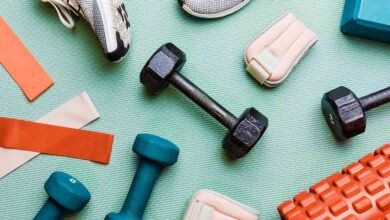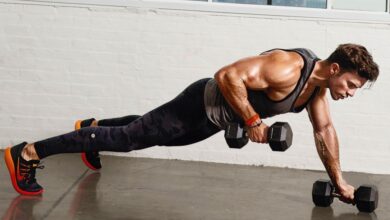Hydration during exercise

Hydration during exercise
Water makes up 60-70% of the weight of an adult human body. That’s a lot, so you can guess it’s critical to our proper functioning. However, in order to perform its tasks, it must be constantly supplied to the body. According to the recommendations, it should be at least 6 glasses of water per day.
In some cases, the demand for water is higher and this time we are looking at one of them, which is physical activity.
harmful dehydration
We are more prone to dehydration during exercise. This is because we breathe faster and sweat faster. This way we lose water and electrolytes. If the losses are not compensated, the body is less efficient, the training is less effective, and that certainly wasn’t the point… The only thing left after training is a crazy heart rate and extreme fatigue? It is very likely that your body is dehydrated. Fortunately, by making a few changes, there is an easy way to reverse this.
So when, how much and what should you drink?
The American Society for Sports Medicine (ACSM) recommends drinking fluids before, during, and after exercise. It is recommended to drink 400-600 ml of fluid 2 hours before your workout. This way, your body will stay hydrated and will also have plenty of time to flush out any excess water.
During exercise, it is recommended to take 150-300 ml of fluid every 15-20 minutes, while it is wrong to reach for the drink only when feeling thirsty.
Hydration should also be continued after exercise, so it is recommended that fluids be given 1.5 times (150%) more than the amount lost during exercise. How do you know how much water we lost? The easiest way is to weigh yourself before and right after tennis, reducing each kilogram which means liters of fluid. The American College of Sports Medicine recommends at least 450-675 ml of fluid for every 0.5 kg of weight lost.
If you train less intensely, that is, you choose to walk or bike, and the effort lasts no more than an hour, then the water will be a sufficient drink to replace the lost fluids.
For more advanced and longer-lasting exercise (eg soccer match, tennis, squash), sports drinks that contain 4-8% carbohydrates (4-8g of carbohydrates per 100ml of fluid) may be a better choice. Its consumption has been shown to delay the onset of fatigue and improve efficiency.
What exactly are sports drinks?
Sports drink ingredients include simple sugars (glucose), complex sugars (maltodextrin), electrolytes (sodium and potassium ions) and water-soluble vitamins. When you decide to use such a liquid, you will have to choose whether to choose a hypotonic, isotonic or hypertonic drink. How are they different from each other? A hypotonic drink contains fewer molecules (carbohydrates and electrolytes) per
100 ml of body fluid, isotonic very similar amount, more hypertonic. Experts say isotonic is the best way to rehydrate the body.
There is a wide variety of this type of drink on the market, so that you do not get lost in it and be able to decide wisely, in the next article we will tell you what to follow, as well as how to make it easily. Sports drinks.
In short, the recommendations provided should guide us accordingly, but every organism is different and it takes time to develop the best hydration regimen. The most important rule to remember is hydration as a foundation that should not be overlooked. We will certainly “please” the body in this way, and therefore the desired effects will be at our fingertips.



